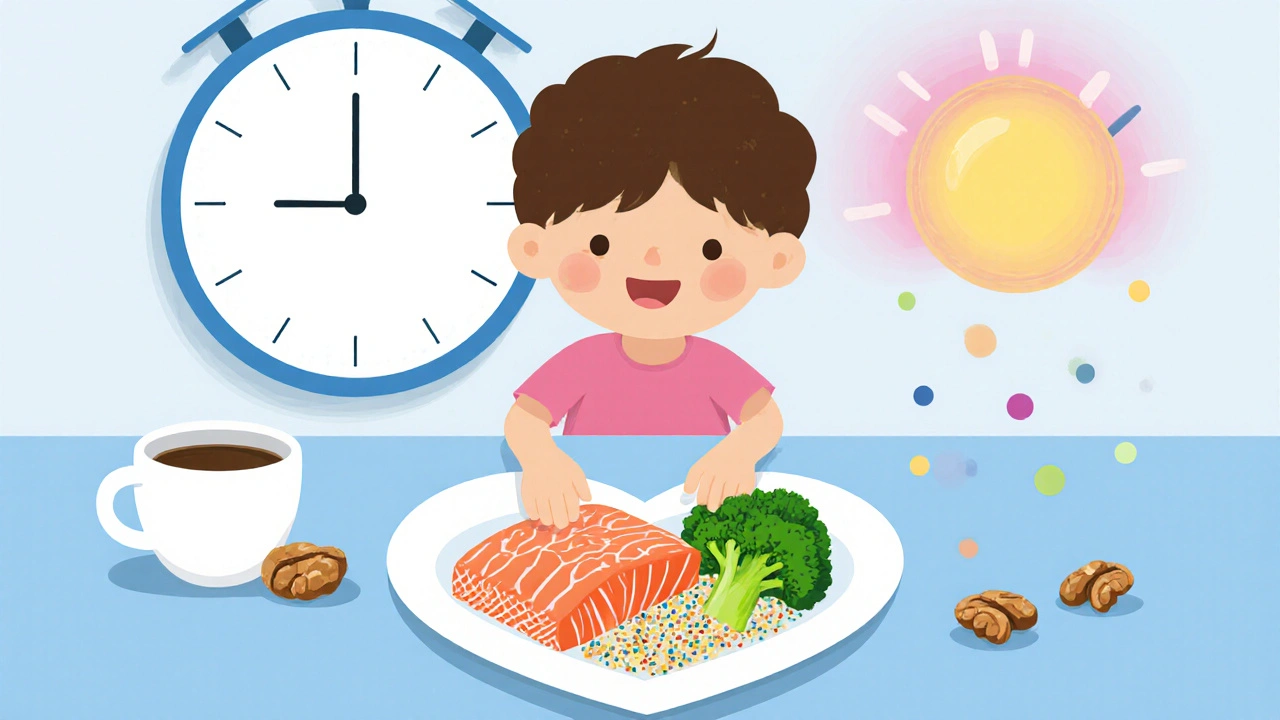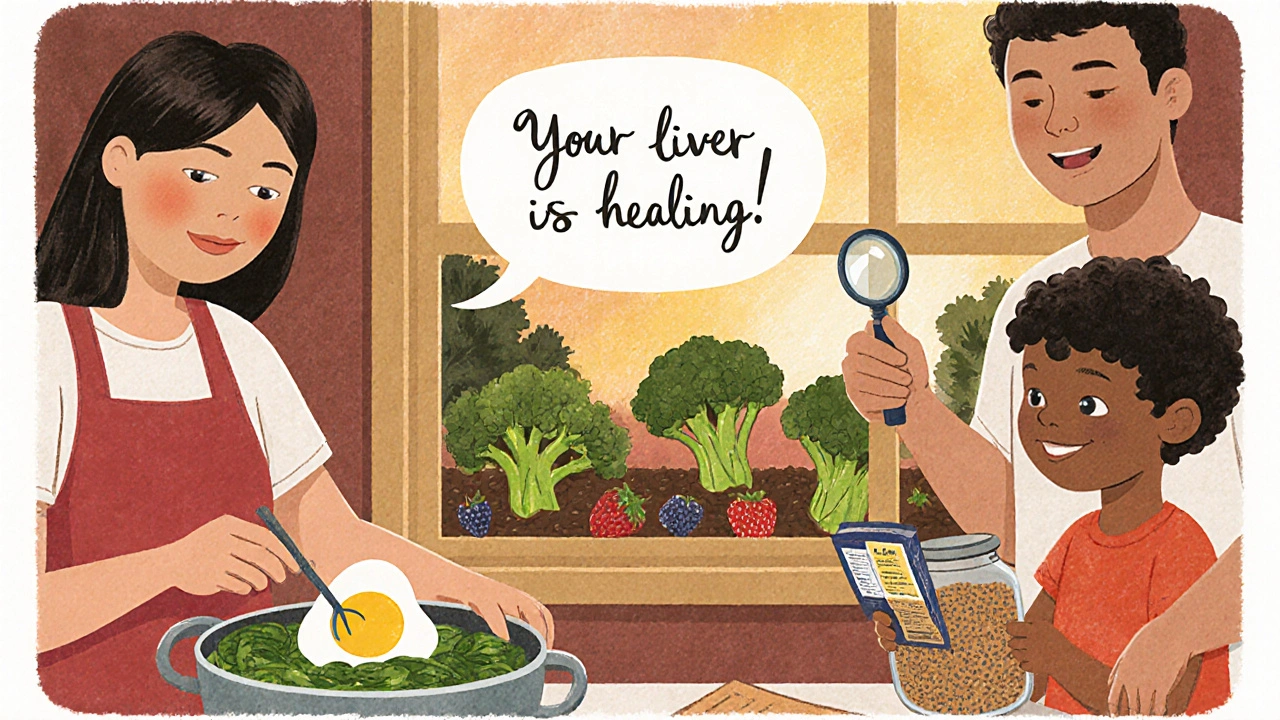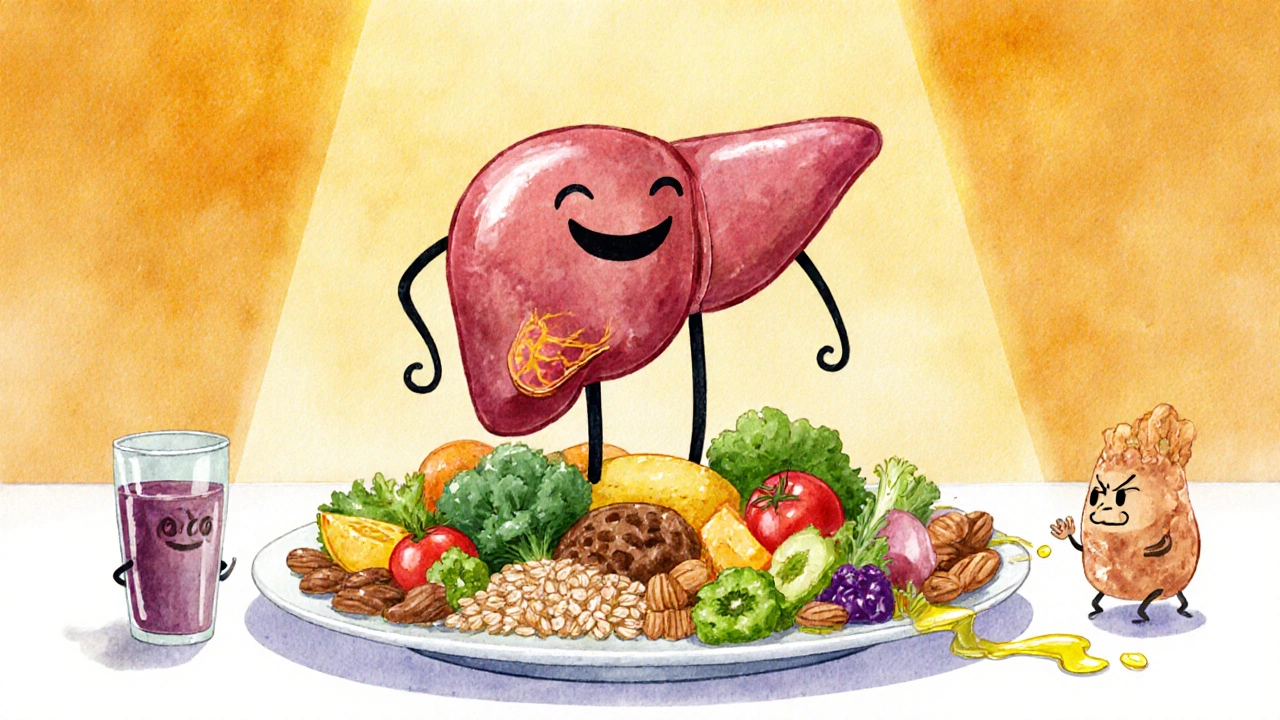When your liver is struggling, food isn’t just fuel-it’s medicine. Many people assume liver damage is only caused by alcohol or drugs, but the truth is far more common: fatty liver disease affects nearly 1 in 4 adults in the U.S., and most don’t even know it. The good news? You don’t need pills or surgery. What you eat every day can shrink liver fat, lower inflammation, and even reverse early-stage damage. This isn’t a quick fix or a detox trend. It’s science-backed nutrition that’s been tested in hospitals, labs, and real lives.
What Actually Helps the Liver Heal?
The liver doesn’t need a special cleanse or miracle supplement. It needs balance. Decades of research show that the Mediterranean diet is the most effective eating pattern for liver health. Not because it’s trendy, but because it directly targets what’s wrong inside your liver: too much fat, too much sugar, and too much inflammation. A 2013 study in Hepatology found that people with fatty liver disease who followed a Mediterranean diet reduced liver fat by up to 40% in just 12 months-without losing weight. That’s not a fluke. Multiple studies since then, including a 2022 review in the Journal of Hepatology, confirm the same result: this diet improves liver enzymes by 20-30% and slows or reverses fibrosis. So what makes it work? It’s not one magic food. It’s the pattern:- 40-50% of calories come from whole grains, legumes, fruits, and vegetables-high in fiber and low in added sugar
- Fat makes up less than 30% of calories, but most of it comes from olive oil, nuts, and avocados-healthy fats that reduce bad cholesterol and liver fat
- Protein is kept at 15-20% of daily intake, with lean sources like fish, chicken, tofu, and beans
- Sugar? Cut out sugary drinks completely. That’s one of the biggest triggers for fatty liver.
The Liver-Healthy Plate: What to Put on Your Plate
Forget complicated calorie counting. The Harvard Healthy Eating Plate gives you a simple visual guide:- Half your plate: Vegetables and fruits. Aim for at least 3 servings of veggies and 2 of fruit daily. Color matters-blueberries, blackberries, red cabbage, and spinach are packed with antioxidants that fight liver inflammation.
- One-quarter: Lean protein. A 3-ounce portion (about the size of a deck of cards) of salmon, chicken breast, tofu, or lentils per meal.
- One-quarter: Whole grains. Brown rice, quinoa, oats, barley-not white bread, pasta, or rice.
- Walnuts: Just 30 grams (about a handful) daily can lower LDL cholesterol by 15% in fatty liver patients.
- Cruciferous vegetables: Broccoli, kale, Brussels sprouts contain indole-3-carbinol, shown to reduce liver fat by 18% in 6 months.
- Green tea: One to two cups daily may reduce liver enzyme levels and oxidative stress.
- Coffee: Drinking 2-3 cups a day (without sugar or creamer) is linked to lower rates of liver fibrosis and cirrhosis.
What to Avoid-The Real Enemies of Your Liver
Some foods aren’t just empty calories-they actively harm your liver. Here’s what to cut out:- Sugary drinks: Soda, sweetened tea, energy drinks, even fruit juice. One 12-ounce can adds 150-200 empty calories and floods your liver with fructose-the sugar that turns directly into fat inside liver cells.
- Trans fats: Found in fried foods, packaged snacks, and margarine. These are linked to increased liver inflammation and insulin resistance. Check labels for “partially hydrogenated oils”-if it’s there, avoid it.
- Refined carbs: White bread, pastries, crackers, and pasta spike blood sugar and insulin, which tells your liver to store more fat.
- Excess sodium: More than 2,000 mg per day can worsen fluid retention, especially if you have advanced liver disease. Skip canned soups, processed meats, and restaurant meals.
- “Detox” juices and cleanses: The American Liver Foundation says flat out: there’s zero scientific evidence they help. Your liver detoxes itself. All these cleanses do is make you hungry, tired, and poorer.
Why Mediterranean Diet Beats Low-Fat and Keto
You’ve probably heard of low-fat diets or keto for weight loss. But for your liver, they’re not equal. A 2021 meta-analysis in Clinical Gastroenterology and Hepatology compared diets in over 1,200 patients:- Mediterranean diet: Reduced liver fat by 32% more than low-fat diets.
- Mediterranean diet: Improved fibrosis scores 18% better than keto diets.
- Keto diets: May help short-term weight loss but can raise liver enzymes in some people due to high saturated fat intake.
- Low-fat diets: Often replace fat with sugar and refined carbs-worse for the liver.

Real People, Real Results
John, 58, from Ohio, was diagnosed with stage 2 liver fibrosis. His FibroScan score was 12.5 kPa-signaling moderate scarring. His ALT (liver enzyme) was 112 U/L, nearly triple the normal range. He didn’t take a pill. He changed his diet. For nine months, he ate like the Mediterranean diet recommends: daily vegetables, olive oil on everything, fish twice a week, no soda, no white bread. He walked 30 minutes a day. His next scan? 6.2 kPa. Normal. His ALT dropped to 45 U/L. His doctor called it “remarkable improvement.” On Reddit’s r/FattyLiver community, 68% of over 1,200 people reported better energy and less brain fog within 3 months. But 42% said it was hard-because healthy food often costs more. A USDA analysis found Mediterranean meals run about $1.50 more per meal than processed alternatives. Sarah, from Texas, tried cutting all sugar and got terrible migraines. Her hepatologist adjusted her plan: instead of zero sugar, she could have 15 grams a day from berries. That small tweak made all the difference.How to Start-Without Feeling Overwhelmed
You don’t need to overhaul your life overnight. Start small:- Swap one drink: Replace soda or sweet tea with water, unsweetened tea, or sparkling water with lemon.
- Add one vegetable: Toss spinach into your eggs, add sliced bell peppers to your sandwich, or snack on carrot sticks with hummus.
- Use olive oil: Drizzle it on salads, roasted veggies, or whole grain toast instead of butter or margarine.
- Read labels: Look for “added sugars” and “partially hydrogenated oils.” If you see them, put it back.
- Batch cook Sundays: Cook a big pot of quinoa, roast a tray of veggies, grill chicken. Use them all week. This saves time and money.
What If You Have Advanced Liver Disease?
If you have cirrhosis or advanced scarring, protein intake needs to be managed carefully. In the past, doctors told patients to limit protein to avoid confusion or brain fog (hepatic encephalopathy). But new research from the European Association for the Study of the Liver (2022) shows that’s outdated. Low protein leads to muscle loss-and muscle loss makes liver disease worse. Now, experts recommend 1.2-1.5 grams of protein per kilogram of body weight daily, even in cirrhosis, unless you’re actively having encephalopathy episodes. Work with your doctor or a registered dietitian. They can help you balance protein sources-prioritizing plant-based and lean animal proteins like eggs, fish, and tofu.
Support Is Out There
You don’t have to do this alone. The VA Health System offers a free 12-week telehealth nutrition program with 87% patient satisfaction. The American Liver Foundation runs a helpline that handled over 12,000 calls in 2023, mostly about meal planning for shift workers or budget constraints. Some insurance plans, including UnitedHealthcare, now cover liver-specific nutrition counseling for 2.3 million Medicaid beneficiaries in 12 states. Ask your doctor or insurer: “Do I qualify for liver disease nutrition support?”What’s Next for Liver Nutrition?
Science is moving fast. A major clinical trial starting in late 2024 will test whether eating only within a 10-hour window (time-restricted eating) boosts the Mediterranean diet’s effects. Early results show a 27% greater drop in liver fat. The Mayo Clinic is also launching a $2.1 million study to see if your gut bacteria can predict which foods will work best for your liver. Personalized nutrition is coming. But right now, the best tool you have is simple: eat real food. More plants. Less sugar. Better fats. Move your body. Give your liver the chance to heal itself.Frequently Asked Questions
Can you reverse fatty liver with diet alone?
Yes, especially in early stages like NAFLD or MASLD. Studies show that following a Mediterranean diet can reduce liver fat by 25-40% in 6-12 months without medication. Even without weight loss, liver enzymes improve by 20-30%. The key is consistency-not perfection.
Is coffee good for the liver?
Yes. Drinking 2-3 cups of black coffee daily is linked to lower rates of liver fibrosis, cirrhosis, and liver cancer. Coffee’s antioxidants reduce inflammation and may block the pathways that lead to fat buildup. Avoid sugar, cream, or flavored syrups-they undo the benefits.
What’s the best protein for liver health?
Lean, high-quality proteins are best: fish (especially fatty fish like salmon), skinless chicken, tofu, beans, lentils, eggs, and low-fat dairy. Avoid processed meats like bacon and sausage-they’re high in saturated fat and sodium, which stress the liver. Plant-based proteins are especially helpful because they come with fiber and antioxidants.
Do I need to take supplements for my liver?
No, not if you’re eating a balanced, whole-food diet. Most liver supplements (like milk thistle or turmeric pills) lack strong evidence. Some can even harm the liver if taken in high doses. Focus on food first. If you have a deficiency (like vitamin D or B12), your doctor can recommend a supplement-but only if blood tests show it’s needed.
How long until I see results?
Many people feel better within 3-4 weeks: more energy, less bloating, clearer thinking. Blood tests (like ALT levels) often improve in 3-6 months. Liver fat reduction takes 6-12 months to show on scans. Progress isn’t always linear-stick with it.
Can I still eat fruit on a liver-healthy diet?
Yes-whole fruit is fine. The fiber in fruit slows sugar absorption, so your liver handles it better. Stick to 2-3 servings per day. Avoid fruit juice, dried fruit, and smoothies-they concentrate sugar without the fiber. Berries, apples, pears, and citrus are top choices.
Is the Mediterranean diet expensive?
It can be, but it doesn’t have to be. Frozen vegetables, canned beans, eggs, oats, and seasonal produce are affordable. Buy in bulk. Cook at home. Skip expensive superfoods like goji berries or chia seeds-lentils and broccoli work just as well. Community cooking programs have cut costs by 35% while keeping nutrition intact.
Next Steps
If you’re just starting:- Write down what you eat for 3 days. Look for sugary drinks, white carbs, and processed snacks.
- Replace one item with a liver-friendly swap: soda → sparkling water, white rice → quinoa, chips → almonds.
- Call your doctor and ask: “Can you refer me to a dietitian who specializes in liver disease?”
- Download the American Liver Foundation’s free “Liver Healthy Plate” guide-it’s visual, simple, and practical.


Yeah sure, eat more broccoli and call it a day. My liver’s fine, thanks for the lecture.
Really appreciate this breakdown. I’ve been following the Mediterranean diet for 8 months now after my ALT spiked to 98. Last bloodwork? 37. No meds, just olive oil, walnuts, and ditching soda. Also, black coffee daily - no sugar, no cream. I swear by it. And yeah, frozen veggies are a lifesaver. Don’t let the ‘fresh only’ crowd fool you.
Oh please. You think eating a few greens is going to fix what Big Pharma and the sugar industry did to us? This is just another capitalist scam to sell you quinoa and artisanal olive oil while your liver rots. I’ve seen the data - they’re hiding the real cause: glyphosate in our food supply. You’re being manipulated into buying overpriced ‘superfoods’ while the real villains laugh all the way to the bank.
I used to think liver health was about detox teas and lemon water. Then my doctor showed me my FibroScan results - 14.8 kPa. I cried. I didn’t know I could cry over a liver. So I started small: swapped soda for sparkling water with lime. Added one serving of broccoli. Drank black coffee. No grand gestures. Three months later, my energy came back. Not because I ‘fixed’ myself - because I stopped poisoning myself. Your liver doesn’t need miracles. It just needs you to stop being its enemy.
Look, I get it - you want to save your liver, but let’s be real. Most people don’t have the time, money, or willpower to cook quinoa and roast Brussels sprouts every night. I work two jobs, have three kids, and my ‘meal prep’ is microwaving frozen burritos. So yes, the Mediterranean diet is ideal - but it’s a luxury for people who don’t live paycheck to paycheck. I’ve seen people in food deserts try to follow this and just give up because the kale costs $8 a bag. We need policy changes - not just individual willpower. Fix the system, not just the person.
Let me break this down for you like a 5-year-old: You eat sugar = liver turns it into fat. You eat olive oil = liver says ‘thank you’. You eat broccoli = liver does a happy dance. You drink soda = liver calls 911. Simple. No magic. No supplements. Just math. And if you can’t do math, then maybe you shouldn’t be eating.
I used to think ‘healthy eating’ meant eating like a rabbit and being miserable. Then I tried the Mediterranean way - not as a diet, but as a lifestyle. I started with one change: swapping butter on toast for olive oil. That one thing made me realize: food can be delicious AND healing. Now I eat roasted eggplant with tahini, lentil stew with cinnamon, and walnuts as snacks. My wife says I’ve become ‘that guy’ who talks about liver enzymes at dinner parties. But hey - I’m alive, my skin cleared up, and I haven’t had a migraine in a year. This isn’t about restriction. It’s about rediscovering joy in real food.
Thank you for the comprehensive, evidence-based overview. I’ve been a registered dietitian for 17 years, specializing in hepatology, and I can confirm: the Mediterranean pattern is the gold standard. The data is overwhelming. What’s concerning is how often patients are misled by ‘detox’ trends or keto extremes. I tell my clients: ‘Your liver is the most resilient organ in your body - if you stop beating it up.’ The key is consistency, not perfection. And yes - frozen spinach is nutritionally equivalent to fresh. Save your money. Focus on whole, unprocessed ingredients. No supplements needed unless lab-confirmed deficiency. And please - read labels. ‘Evaporated cane juice’ is just sugar. Stop being fooled.
As a British man who has spent decades in the NHS observing liver disease, I must say: this is the most accurate, scientifically grounded piece I’ve encountered in the past five years. The Mediterranean diet’s efficacy is not anecdotal - it’s replicated across three continents. I have seen patients with NASH reverse fibrosis without pharmaceutical intervention. It is a triumph of nutritional science over snake oil. That said, the cost barrier is real. The UK’s food poverty crisis means many cannot access fresh produce. This is not a failure of will - it is a failure of policy. We must treat nutrition as public health infrastructure, not a lifestyle brand.
you know what really causes fatty liver? vaccines. and 5g. and the water they put fluoride in. the diet thing is just a distraction so you dont ask the real questions. i stopped eating bread and my liver felt better - but only because i stopped drinking the tap water. my cousin in texas got his liver fixed by drinking apple cider vinegar and sleeping in a pyramid. science is a lie. trust your gut.
Let’s be honest: the entire premise of this article is built on the fallacy that the liver is a passive victim of dietary choices. The liver doesn’t ‘heal’ because you ate broccoli - it heals because you stopped metabolizing toxins. The real villain isn’t sugar - it’s insulin resistance, which is a symptom of systemic inflammation caused by chronic stress, sleep deprivation, and sedentary lifestyles. You can eat all the olive oil in the world, but if you’re sitting at a desk 12 hours a day and sleeping 5 hours, your liver is still drowning. This article is dangerously reductive. Nutrition is one piece. Sleep, movement, and mental health are the other three. Ignore them, and you’re just rearranging deck chairs on the Titanic.
I read this whole thing and felt guilty for 20 minutes. Then I ate a bag of Doritos and drank a soda. My liver doesn’t care about your studies. It just wants to be left alone while I binge-watch Netflix. Also, I’m pretty sure my liver is a sentient being that hates me. I’m not ready for ‘liver healing.’ I’m ready for a nap.
As someone who grew up in a household where liver disease ran in the family, I’ve watched my father go from 120kg to 72kg through diet alone. He didn’t do keto. He didn’t do juice cleanses. He ate like his ancestors did - beans, rice, greens, fish, no sugar. He’s 72 now. No medication. No transplant. Just consistency. I’ve started doing the same. It’s not about perfection. It’s about showing up. Your liver doesn’t care if you’re rich, poor, American, or Indian. It just cares if you feed it poison or peace. Choose peace.